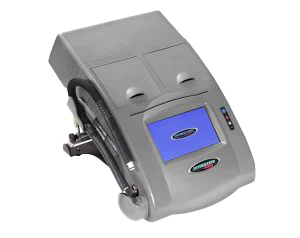PCR vs Cultures for Infectious Disease Testing
Ready to inquire about PCR vs Cultures for Infectious Disease Testing? Contact us by one of the methods below:
We are dedicated to helping law enforcement conduct accurate alcohol breath testing.
The Intoxilyzer 9000

Why PCR Testing is Superior to Cultures for Infectious Disease Testing
At Quality Forensic Toxicology, we prioritize fast, accurate, and reliable diagnostic solutions. When it comes to infectious disease testing, Polymerase Chain Reaction (PCR) testing has emerged as the gold standard, offering significant advantages over traditional culture methods.
- Faster Results
Traditional cultures can take days to weeks to yield results, especially for slow-growing bacteria or viruses. PCR testing, however, can detect pathogens within hours, allowing for quicker clinical decisions and improved patient outcomes.
- Greater Sensitivity and Accuracy
PCR testing identifies the genetic material (DNA or RNA) of pathogens, making it far more sensitive than cultures. Even when an infection is in its early stages or if the sample contains low levels of the pathogen, PCR can still provide an accurate result, whereas cultures may yield false negatives.
- Detects Hard-to-Culture Pathogens
Some infectious agents—such as viruses, anaerobic bacteria, and intracellular bacteria like Chlamydia and Mycoplasma—are difficult or impossible to grow in a culture. PCR testing bypasses this limitation by directly detecting the organism’s genetic code, ensuring broader diagnostic coverage.
- Works Even After Antibiotic Use
Patients who have started antibiotics before testing may show false negatives in culture-based tests because the medication inhibits bacterial growth. PCR, however, detects microbial DNA regardless of antibiotic use, making it a superior option for accurate diagnosis.
- Multiplex Testing Capability
With PCR, multiple pathogens can be detected simultaneously in a single test, reducing the need for multiple cultures and expediting treatment decisions. This is especially beneficial for respiratory infections, sexually transmitted diseases (STDs), and gastrointestinal infections.
- Reduced Contamination Risks
Culturing live bacteria requires specialized conditions that increase the risk of cross-contamination or overgrowth of non-target organisms. PCR testing eliminates this risk, leading to more specific and reliable results. - Conclusion
PCR testing is faster, more accurate, and more comprehensive than traditional culture methods, making it the preferred choice for infectious disease diagnostics. At Quality Forensic Toxicology, we utilize cutting-edge PCR technology to provide rapid, high-quality results that support better clinical decisions and patient care.
For more information about our PCR testing services, contact us today!
